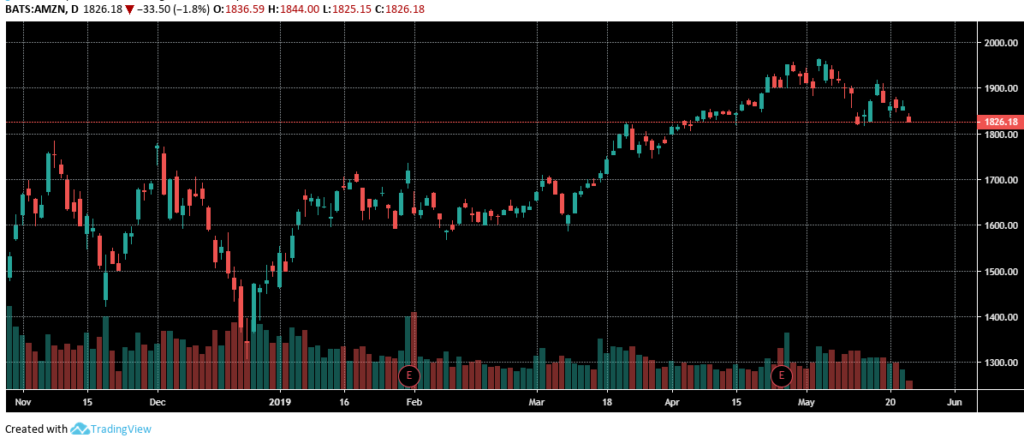In an effort to halt the sale of its Rekognition technology, a pair of Amazon shareholder groups attempted to pass motions to keep the retail giant from pushing the facial recognition software to the market.
At the annual Amazon shareholder meeting in Seattle, the two proposals — one to ban the sale of the software until it is determined its use doesn’t violate civil liberties, and the second, which asked for an independent study on privacy and human rights violations — failed, according to CNET.
Shares of Amazon Com Inc. were trading down 2.2% to $1,818 by lunchtime Thursday on the East Coast.

“The fact that there needed to be a vote on this is an embarrassment for Amazon’s leadership team. It demonstrates shareholders do not have confidence that company executives are properly understanding or addressing the civil and human rights impacts of its role in facilitating pervasive government surveillance,” American Civil Liberties Union of Washington’s Technology and Liberty Project director Shankar Narayan said in a statement, as reported by CNET. “While we have yet to see the exact breakdown of the vote, this shareholder intervention should serve as a wake-up call for the company to reckon with the real harms of face surveillance and to change course.”
In the recommendation of the Board of Directors, Amazon said the software has been used “to aid non-profit, advocacy, and government groups to rescue victims of human trafficking, inhibit child exploitation, and reunite missing children with their families.”
The company also said it has not received any negative reports of the technology “being used in a harmful manner positing in the proposal,” and that it as “aware of many beneficial purposes of Amazon Rekognition, including by law enforcement to help improve public safety.”
The vote — final numbers won’t be disclosed until Friday — came at the same time the House Committee on Oversight and Reform held hearings on facial recognition technology.
Andrew Ferguson, professor of law at the University of the District of Columbia’s David A. Clarke School of Law, said it would take action from Congress to “respond to the real-time threats of real-time technology.”
“Facial recognition systems deployed broadly raises the specter of arbitrary surveillance,” Ferguson said, in his written testimony before the committee. “Without appropriate safeguards, face surveillance can become a generalized dragnet where every person becomes the target of government monitoring. The open question is whether the Fourth Amendment will be interpreted to be one of those safeguards.”
The ACLU has also publicly spoken out about the use of facial recognition software, suggesting Amazon has “failed to acknowledge the very real danger that Rekognition pose,” while also ignoring a wide range of experts and civil liberties organizations who have protested the technology. The ACLU has also claimed the Rekognition technology “has been shown to be less accurate for people of color,” suggesting the software “will be leveraged to invade our privacy and disproportionately [be] turned against black and brown communities, religious minorities, immigrants and activists.”
We're at @Amazon's shareholder meeting today urging shareholders to take action in response to the company's failure to address the civil rights impacts of its face surveillance technology.
Ironically, Amazon won't allow cameras into the meeting, so we've filmed a short preview: pic.twitter.com/tNN4pkK4tG
— ACLU (@ACLU) May 22, 2019
Amazon officials responded by saying the sale of Rekognition should not be banned “because of its potential misuse,” but rather all parties should talk to “ensure that the technology is applied appropriately and is continuously enhanced.”
One sheriff’s office in Oregon has already implemented the software to investigate crime and make arrests, according to CNET.
Despite neither of the measures passing, organizers said it would not stop attempting to ban the sale of the technology.
“Amazon’s refusal to acknowledge and confront the potential harms of Rekognition is ongoing evidence of corporate arrogance,” Michael Connor, Open MIC’s executive director, said in an email to CNET. “Investors have a right to know how Amazon intends to address these material risks to the company and its reputation. As one of the leading technology companies in the world, Amazon can and must do better.”
Amazon is walking a dangerous line with this software, setting the stage for a potential court showdown and challenge to the Fourth Amendment.




